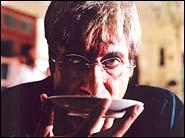-Nimish Inamdar
30th July 2005.
This is the way the title of a book released recently by Penguin Publishers goes. The writer Rudranshu Mukherjee is a graduate from Oxford University and was awarded a D.Phil in Modern History by university of Oxford in 1981. In his book the writer pens down the detailed scenario on, before and after the fatal or the fateful day of 29th March 1857.
First of all let me clear a misconception about Mangal Pandey actually killed his senior. No he did not. Yes he did shoot on one of the officers, but it didn’t work as the ball missed Sergent Major James Hewson and he was saved. But Mangal Pandey seriously injured Hewson and Lt. Baugh in a sword fight and was hanged for the same.
Two days after this incidence started his trial that lasted for one single day, as a result which was well predicted by all that Mangal Pandey went to gallows. In his trial Pandey confessed of drug addiction, which he started off late and also made it clear that he was under the intoxication of Bhang when he acted the way he did. He could reveal nothing more than, “I was not in right senses and I did not know what I was doing.” This was as opposed to the British expectation of revealing names of his colleagues who could possibly revolt in near future.
The writer grabs this point and raises an issue that he being in the state of intoxication, was certainly not aware of what he was doing and turns out to be an accidental hero. But also raises out a possibility that Pandey needed that intoxication to carry the guts he needed to revolt.
I reckon that it makes sense, and thus for me at least there is no doubt about him being a true martyr.

But there are also certain facts that cannot be overlooked, and they do raise another question of whether his sacrifice was really worthwhile to blow the whole of North India against the East India Company? Mangal Pandey was a sepoy at the Barrackpore Cantonment near Calcutta. The first revolt that took place was miles away at Meerut.
The story there follows in this way that 85 sepoys were detained and sentenced to 8 years of rigorous imprisonment since they refused to touch the newly introduced Enfield Cartridges. The rumor about the Enfield cartridges being greased with the cow and pig fat had a grip over the whole of North India. Meerut was a place where according to the writer the name Mangal Pandey had not reached. It was the fury against the British Raj to detain those 85 sepoys that led to the revolt. The writer makes another point worth noting, that throughout the 1857 revolt, the Barrackpore Cantonment didn’t budge and the neighboring Calcutta remained loyal to the British Raj.
If Mangal Pandey didn’t much contribute to the revolt, then one would raise questions about his fame. The answer according to Mr. Mukherjee is that Mangal Pandey being one of the first revolting people, had created a sense of treat in the minds of the British. Pandey was a common name amongst the Indians and that prompted the rulers to generalize the term “Pandeys” against the revolting people. Thus his name got encrypted in history.
The forthcoming Amir Khan starred movie should be thus worth watching. I presume they must have completely exploited the mystery about Mangal Pandey’s life to make fiction out of reality. None of the records that exist till now have given perfect information about Mangal Pandey’s past, his parents, his wife, or that whether he was married or not, from where did he come etc. Thus Ketan Mehta gets a full opportunity to use things according to his convenience.
To sum up the 1857 revolt had a sole reason as the spark for the fuel, and that was the greased cartridge. I’d like to end here by a verse made by the last Mughal Emperor
Na Iran ne kiya, na Shah Russ ne,
Angrez ko tabah kiya kaartoosh ne.
[Neither Iran nor the Tsar of Russia could do what the cartridges (in India) did]
And thus... here started The Rising.
